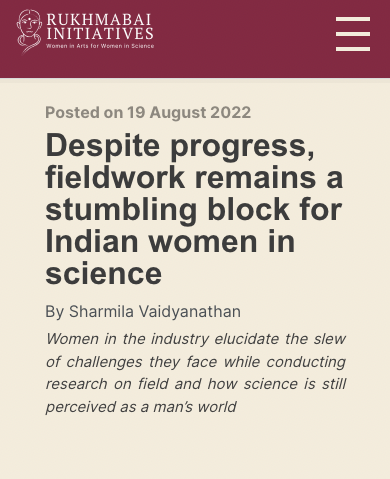Women in the industry elucidate the slew of challenges they face while conducting research on field and how science is still perceived as a man’s world.
The story was produced with the help of the Rukhmabai Fellowship and published on 19 August, 2022.
It was a scorching summer morning in 2018 in rural Purulia in West Bengal, when geologist and palaeobiologist Dr Sanjukta Chakravorti, who was working on her PhD thesis then, had taken a break from her excavations and was approached by two school girls.
“Didi, what are you doing?” one of them had asked.
Dr Chakravorti had grabbed the opportunity to talk about her work in layperson’s terms. Soon, her open-air classroom attracted more onlookers, and the researcher found herself addressing a small gathering of villagers, awed and inspired by her work.
This slice of memory is something Dr Chakravorti cherishes, but for many women fieldwork is fraught with anxiety. An article on how female scientists in the West had to forge their way ahead in fieldwork provides a nuanced look at the issue. Such an account from an Indian perspective, however, is largely missing.
Fieldwork is a vital part of scientific research in many disciplines like evolutionary biology, herpetology, palaeontology, marine biology, and environmental studies. But for female researchers and students, fieldwork continues to pose several challenges. Apart from safety concerns, lack of sanitary facilities, the need to balance family commitments, and dearth of support from authorities come in the way of completing their projects.
Furthermore, issues surrounding fieldwork are not specific to rural or remote areas either. Dr Harini Nagendra, Director, Research Centre & Lead, at the Centre for Climate Change at Azim Premji University, says women in the industry face safety concerns in urban settings, as well. As a precautionary measure, her team members never function alone, especially when conducting door-to-door assessments or exploring peri-urban and less-frequented parts of cities.
Dr Chakravorti adds: “A question that women get asked constantly is what fayda (benefit) they get from staying away from home in a remote location. Families question whether it is worth the trouble and also why they couldn’t take on a job that would be much less hassle and more money.”
Read the complete story on Rukhmabai Initiatives.
